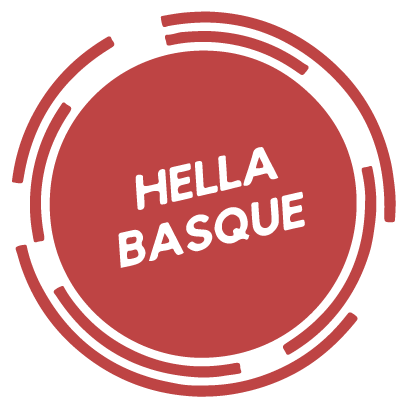This post contains affiliate links, meaning if you click through and make a purchase, I may earn a commission at no additional cost to you. As an Amazon Associate I earn from qualifying purchases.
When my parents named me, it was important for them to find a name that worked in both English and in French. English because that would be the language of my environment and French because that is the language both of my parents and their families speak.
They settled on Anne-Marie, inadvertently showing how very Catholic they are in the process.
So I missed out on getting a Basque first name. (Only Aita’s side speaks Basque.)
But it just goes to show how our first names say a lot about where we come from and the types of people we come from. After all, our parents are the ones who choose our names, so they may be more of a reflection on them than ourselves.
Where many Basques are concerned, naming is an important political practice because for centuries in both France and Spain, Basque names were not legally admissible.
With laws being reformed more recently, the Basque Country and its diaspora are seeing a resurgence in Basque first names.
Today, most Basque first names can legally be registered with local authorities.
But I hate to tell you, the correct spellings of some Basque names still cannot be registered in France and parts of the United States.
Naming Laws in France
Until 1993, parents in France could only name their children from an official approved government list.
This came into effect with the French Revolution and was codified under Napoleon Bonaparte, in Napoleon’s efforts to make France an ultra-uniform French state.
(Ironic since Napoleon was born with a decidedly un-French name and didn’t learn French until he was 10. Overcompensating much?)
At the time of the French Revolution, around only 3 million of France’s 25 million inhabitants spoke Parisian French as their native language.
In order to govern everyone properly, it was deemed important that everyone speak the same language. The strict French name requirement was just one part of the strategy to meet that goal.
Names allowed in France centered on Biblical names and those of Catholic saints and other important historical figures. Think lots of Jeans and Maries.
RECOMMENDED Basques Are Unique: It’s In Our Blood
Since 1993, parents have had more freedom in their name choices. President François Mitterand’s administration revoked the obligation to use the official names list, but the French government still has some provisions around naming.
Primarily: Names must be written in French and they must not go against the best interest of the child.
Courts have the authority to veto any names deemed to go against these criteria. Names that have been rejected due to potential embarrassment to the child include: Nutella, Manhattan, Fraise, Ravi, Mini Cooper, MJ, Joyeux, and Prince William.
What concerns Basques the most under these naming criteria is the sole use of French letters and accents in naming.
Certain Basque names contain a tilde (ex: ñ), which is not an accent used in the French language and therefore not allowed in baby names in France.
A couple from Brittany last year wanted to name their newborn son Fañch, a traditional Breton variant of François. A French court banned the spelling with a tilde, despite the baby having already been issued an ID and passport with the name Fañch spelled correctly.
I haven’t read of any reports of Basque parents fighting this law, but Basque names such as Beñat, Iñaki, Garbiñe, and Eguzkiñe would technically not be allowed on official French documents under the current laws.
Naming Laws in Spain
Much like France to the north, Spain for centuries required parents to give their children Spanish names rooted in the Catholic tradition. Where France had Jeans and Maries, Spain has a plethora of Josés and Marías.
Under the dictatorship of Francisco Franco, this was strictly enforced and Basque names were banned from public record.
Whereas in France during this time period Basques would have been able to colloquially use their Basque names, the repression of the Basque language under Franco meant Basques would have been taking risks to use Basque names even when going about their daily lives in some areas.
After Franco’s death, many Basques changed their Spanish names to their Basque equivalents.
Even until 1978, Basque last names had to be registered using Spanish phonetical rules (think Echeverria instead of Etxeberria), as Spanish was the single official language.
Luckily, things have changed.
RECOMMENDED The Ultimate List of Hollywood Movies Filmed in the Basque Country
Currently, the only limitations of baby names in Spain require that the name could not offend a person’s dignity or cause identity confusion (gendered names not aligned with the person’s biological sex) or be the same as an existing sibling.
As such, Basque names in Spain can be used in official registries. Yay!
Naming Laws in the United States
The US has much more liberal naming laws than France and Spain, with celebrities and normal folks alike notorious for giving their children unconventional names.
However the state of California does not allow accents in names, since Proposition 63 made English the official language of California in 1986.
With California having such a large Spanish-speaking population, it’s no wonder a bill was introduced in the State Assembly last year to allow accent marks in official names. Governor Jerry Brown vetoed the bill over concerns it would be too challenging and expensive to implement.
The US federal government does not use accents regardless, so even in states that do allow them, those people with accents in their names will not have them featured on their American passports or Social Security cards.
So like in France, you can’t officially name your son Iñaki or Beñat in California, but you may be able to in other states. Either way, people can still spell their names however they like informally and no one has to know the official legal spelling.
Did you or would you give your child a Basque first name? Let us know in the comments.
Continue Reading:
- How the Basques Defeated Europe’s Greatest Army and How History Erased Them
- 9 Movies Filmed in the Basque Country
- Paul Laxalt, Basque American Politician from Nevada, Dies at 96


Facebook Comments